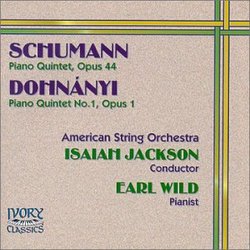| All Artists: Isaiah Jackson, Earl Wild, American String Orchestra, Ernst von Dohnanyi Title: Schumann, Dohnányi: Piano Quintets Members Wishing: 0 Total Copies: 0 Label: Ivory Classics Release Date: 7/4/2000 Genre: Classical Styles: Chamber Music, Historical Periods, Classical (c.1770-1830), Modern, 20th, & 21st Century Number of Discs: 1 SwapaCD Credits: 1 UPCs: 644057100322, 064405710032 |
Search - Isaiah Jackson, Earl Wild, American String Orchestra :: Schumann, Dohnányi: Piano Quintets
 | Isaiah Jackson, Earl Wild, American String Orchestra Schumann, Dohnányi: Piano Quintets Genre: Classical The program notes for this record quote musicologist Alfred Neuman to the effect that the great romantic piano quintets were conceived by their composers as piano concertos with string accompaniment. This rather bold state... more » |
Larger Image |
